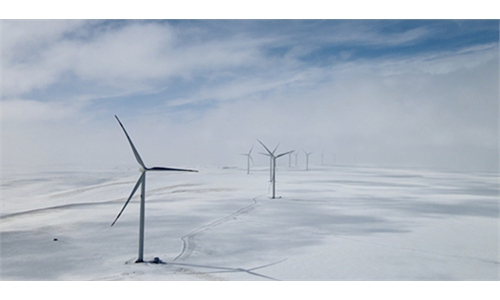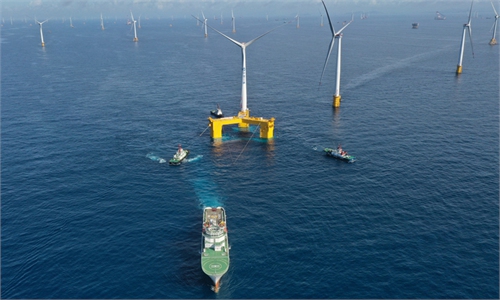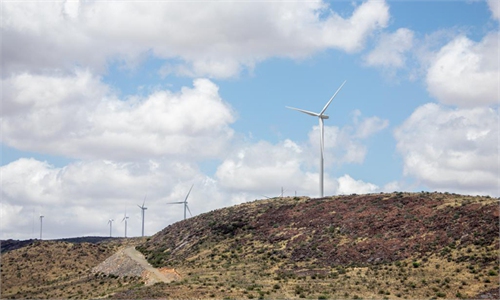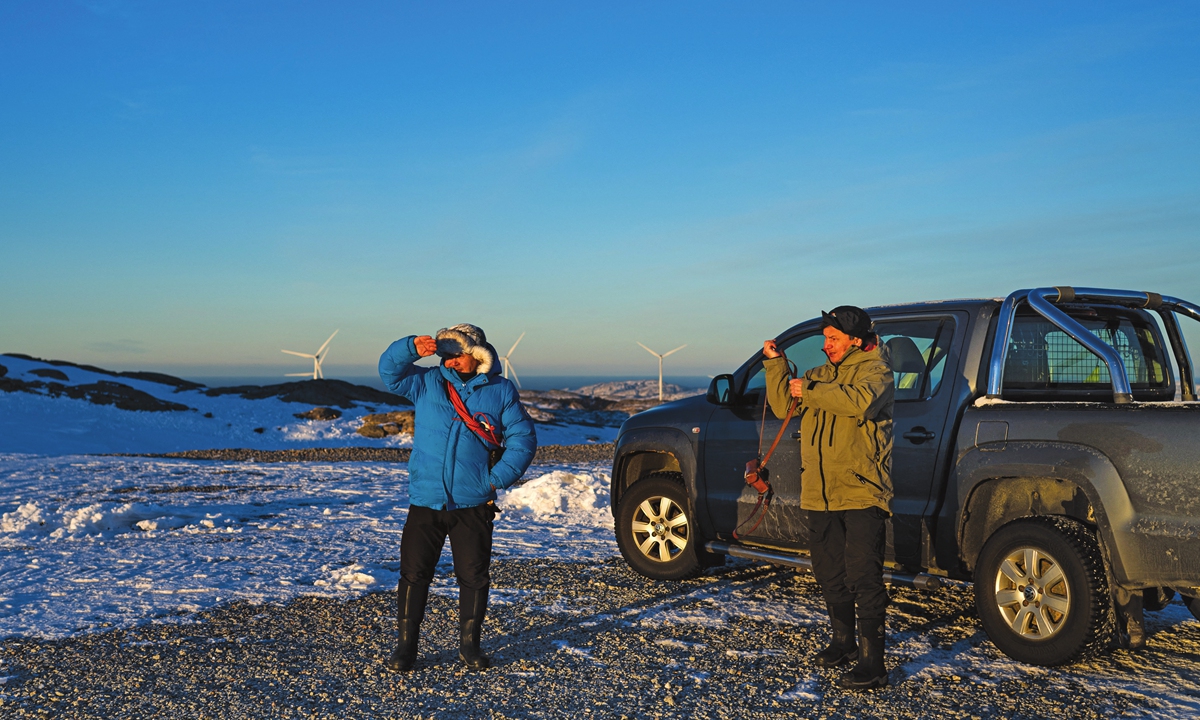
Reindeer herders, Leif Arne Jama (right) and his brother John Kristian Jama, visit the Storheia wind farm, one of Europe's largest land-based wind parks, in Norway on December 7, 2021. Photo:AFP
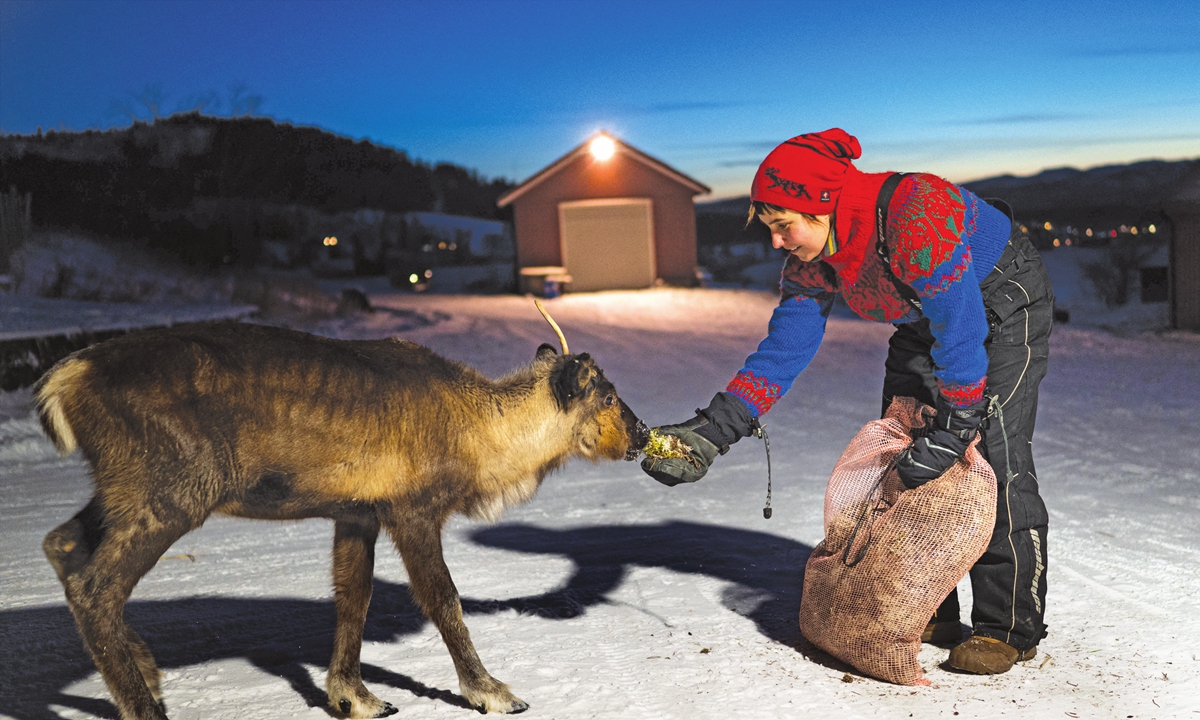
Sissel Stormo Holtan feeds a reindeer outside her home in Namdalseid, Norway, on December 7, 2021. Photo:AFP
On a gusty mountain crest, the Jama brothers weave between wind turbines that stretch as far as the eye can see, on what used to be their animals' winter pasture. Climate emergency or not, for these reindeer herders, the turbines have to go.
"Before, the area was perfect for our reindeer. The place was pristine, unspoiled by human activity. Now, everything has been ruined for years to come," laments Leif Arne, the younger of the brothers, at the wheel of his 4x4.
On both sides of the Arctic polar circle, members of Northern Europe's Sami minority are vehemently opposing large-scale wind farms and other "green" infrastructure projects, which they say are threatening their livelihoods and encroaching on their ancestral traditions.
A classic tale of David and Goliath, and the Sami may end up winning.
In a groundbreaking verdict in October 2021 Norway's Supreme Court ruled that two wind farms erected on the Fosen peninsula, in western Norway, violated the rights of six Sami families, including the Jamas, to practice their culture, breaching the UN's International Covenant on Civil and Political Rights.
With four smaller, neighboring installations, the two wind farms, Storheia and Roan, make up Europe's biggest land-based wind park, with a total capacity of 1,057 megawatts, or enough energy to supply more than 170,000 households.
While the 11 Supreme Court judges unanimously declared invalid the operating permits and expropriation authorizations that paved the way for the construction of the 151 wind turbines, they didn't say anything about what should happen to the structures now.
For the Jama brothers, whose family has been reindeer herding for generations, there is no doubt about the matter. "These turbines have to be dismantled," they insist.
They say the Storheia wind park, completed in 2020, deprives them of the best of their three winter grazing grounds, which they use alternatingly.
Reindeer are nomads that roam, depending on the season, to find lichen, their main source of nourishment, especially in winter. If they're disturbed by the wind turbines, they'll look elsewhere.
Not a reindeer in sight
With his lasso strapped to his shoulder, elder brother John Kristian scans the vast, snow-blanketed horizon with his binoculars.
Not a reindeer in sight.
"It's impossible for the reindeer to come here now, with all the enormous disruptions caused by the turning and turning of the turbines, which scare them. And they make so much noise," he says.
"There are also car parks, roads, crossings... Nature has been completely destroyed here. There's nothing left but rocks and pebbles," he adds.
Before the Supreme Court ruling, a lower court had recommended that the loss of the land be compensated financially, to allow herders to buy fodder for their animals.
They rejected that option outright.
"The reindeer have to find their own food. If we give them feed, it's not traditional herding anymore," Leif Arne says.
If nothing is done, the lack of grazing grounds means the Jamas will have to reduce their herd size, the number of which they don't disclose publicly because "that would be like broadcasting how much money you have in the bank."
At 55, Leif Arne is already struggling to make ends meet.
He told the courts that his business turned a profit of less than 300,000 kroner ($34,000) in 2018.
Reducing his herd would threaten the viability of his operation.
Meanwhile, the turbines continue to spin, despite the court ruling.
"We take the Supreme Court ruling very seriously... We, of course, want to rectify the situation," insists Torbjorn Steen, spokesman for Fosen Vind, the consortium that operates most of the wind farm.
"The next step is to define operating conditions that guarantee we're able to operate the wind turbines without violating the herders' rights or threatening their herding. What we are prioritizing now is to have a dialogue with the herders," he says.
Dantean dilemma
The Norwegian state, the main shareholder in the criticized project through publicly owned energy group Statkraft, now finds itself in a bind.
How does it respect the legal ruling and protect the Sami's rights, without compromising its huge economic interests, the six Fosen wind farms cost a total of more than 1 billion euros, nor slowing down an already sluggish green transition?
Storheia and Roan alone accounted for more than 20 percent of the wind energy produced in Norway in 2020, according to Fosen Vind.
For now, the Petroleum and Energy Ministry, which granted the concessions since declared invalid, has said that more expertise is needed.
"We haven't decided whether the installations can stay in place in part or in full," Minister Marte Mjos Persen told AFP.
That has frustrated the Sami, who see the delay as a stalling manoeuver that allows the turbines to continue to operate, or worse, a way to circumvent the legal ruling.
"The state has to acknowledge that for the past 20 years grave errors have been made, and they can do that by presenting an apology," said Silje Karine Muotka, president of the Sameting, Norway's Sami parliament.
"And concrete actions have to follow: The operating permit has to be canceled, the turbines have to be fully dismantled, and the area has to be restored, replanted and returned to the herders," she told AFP.
With every day that passes, Sissel Stormo Holtan, a 40-year-old herder, loses a little more faith in the legal system. She fought against the Roan wind farm and won.
"Well, nothing has happened even though we won. It feels kind of weird, just starting a new fight all over again and it feels... unfair," she says, as she feeds fistfuls of lichen to a young orphaned reindeer.
AFP
